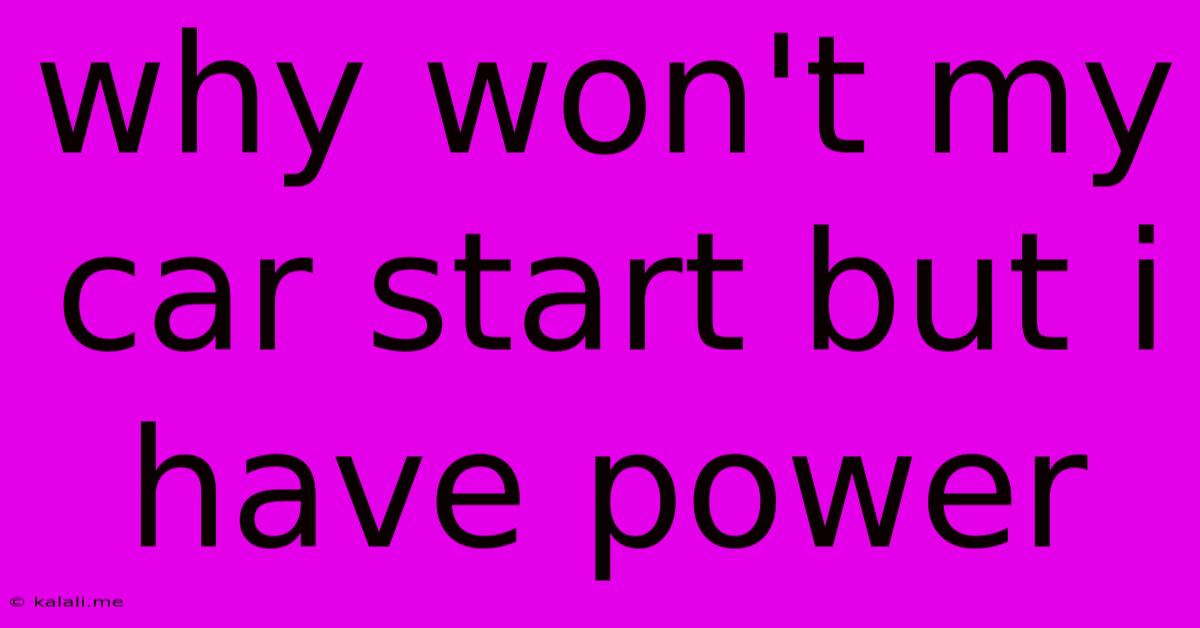Why Won't My Car Start But I Have Power
Kalali
May 25, 2025 · 4 min read

Table of Contents
Why Won't My Car Start But I Have Power? A Troubleshooting Guide
Your car's dashboard lights illuminate, the radio plays, but the engine refuses to crank? This frustrating situation, where you have power but your car won't start, points to a problem beyond a simple dead battery. This guide will walk you through the most common culprits and how to troubleshoot them.
Common Reasons Your Car Won't Start Despite Having Power:
The presence of power in your car, indicated by working lights and radio, suggests the battery itself isn't completely dead. The problem likely lies within the starting system's components or their connections. Let's explore the most probable causes:
1. Faulty Starter Motor: The Engine's Cranking Heart
The starter motor is responsible for turning the engine over, allowing it to ignite. A malfunctioning starter can prevent the engine from even attempting to start, despite having sufficient power.
- Symptoms: You may hear a clicking sound when you turn the key, a grinding noise, or complete silence.
- Troubleshooting: Visually inspect the starter motor for any obvious damage or loose connections. This usually requires some mechanical knowledge. If you hear clicking, it could be a low battery or a faulty solenoid within the starter. A grinding noise suggests a problem with the starter's gear meshing with the flywheel.
2. Weak or Failing Battery: More Than Meets the Eye
While you have power for accessories, a weak battery might not provide the high amperage surge needed to crank the engine. A battery that's on its way out might show enough voltage to power lights, but not enough to turn the starter motor.
- Symptoms: Dim headlights, slow cranking, or clicking sounds when attempting to start.
- Troubleshooting: Use a multimeter to check the battery's voltage. A fully charged battery should read around 12.6 volts. A lower reading indicates a weak battery. Also, test the battery's cranking amps (CCA) – a specialized tool is needed for this test. Low CCA will prevent sufficient power to the starter.
3. Corroded or Loose Battery Cables: A Simple Fix, Often Overlooked
Corrosion buildup on battery terminals or loose connections prevents the flow of sufficient current to the starter motor. This is a common and easily fixable problem.
- Symptoms: Slow cranking, dimming lights while cranking, or no cranking at all.
- Troubleshooting: Carefully inspect the battery terminals and cables for corrosion. Clean them with a wire brush and baking soda solution. Ensure all connections are tight and secure. Replace cables if significantly corroded.
4. Faulty Ignition Switch: The Key to Starting
The ignition switch controls the power flow to the starter motor. A faulty switch can prevent the starter from receiving power, even with a good battery and starter.
- Symptoms: Complete lack of response when turning the key. No clicking sounds or attempts to crank.
- Troubleshooting: This often requires professional diagnosis as it can be difficult to isolate.
5. Neutral Safety Switch (Automatic Transmissions): Gear-Related Startup Issues
For automatic transmission vehicles, the neutral safety switch prevents starting unless the gear selector is in Park or Neutral. A faulty switch can prevent starting even if everything else is functioning correctly.
- Symptoms: Inability to start unless the gear selector is manipulated in a specific way.
- Troubleshooting: Check that the gear selector is firmly in Park or Neutral. If the problem persists, the switch itself might need replacement.
6. Security System Issues: Immobilizer Problems
Modern vehicles often have immobilizer systems that prevent starting unless the correct key is used. A faulty immobilizer, key fob, or other security system component can cause starting issues.
- Symptoms: No response, no cranking, or other unusual behaviour with the security system.
- Troubleshooting: Try a spare key if available. If the problem persists, you might need professional assistance to diagnose the security system.
When to Seek Professional Help:
If you've checked the above points and your car still won't start, it's best to consult a qualified mechanic. More complex issues, such as problems with the ignition system, wiring harness, or computer modules, often require specialized tools and expertise for diagnosis and repair. Don't attempt major repairs yourself unless you have the necessary knowledge and tools. Safety should always be your top priority.
Latest Posts
Latest Posts
-
What To Use To Fill Nail Holes In Molding
May 25, 2025
-
Mac Os X List Usb Devices
May 25, 2025
-
Download Attachments From Multiple Emails Gmail
May 25, 2025
-
What Does In Residence Mean For College
May 25, 2025
-
Send Me A Photo Of You
May 25, 2025
Related Post
Thank you for visiting our website which covers about Why Won't My Car Start But I Have Power . We hope the information provided has been useful to you. Feel free to contact us if you have any questions or need further assistance. See you next time and don't miss to bookmark.